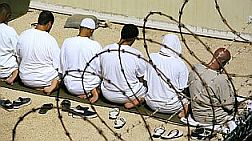Obama Special: How the Administration Abandoned Its Promise to Close Guantanamo (Finn and Kornblut)
 Peter Finn and Anne E. Kornblut, writing in The Washington Post, detail how the Obama Administration gave up its campaign to shut the detention facility at Guantanamo Bay.
Peter Finn and Anne E. Kornblut, writing in The Washington Post, detail how the Obama Administration gave up its campaign to shut the detention facility at Guantanamo Bay.
Some key points:
*The Administration backed away from its initial move in April 2009 --- the transfer to Virginia of eight Uighur Chinese, whose release had been ordered by a Federal court, because of the objections of a single Congressman. The transfer was stopped by Obama's Chief of Staff, Rahm Emanuel.
*"In late April...the president asked Matthew G. Olsen, the Justice Department lawyer heading the task force [reviewing the case of every detainee], approximately how many Guantanamo detainees could be prosecuted....Probably fewer than 20, Olsen said. The president seemed peeved that the number was so small, in contrast with the optimistic predictions during his election campaign that nearly all of the remaining detainees could face trial or be transferred."
*The Administration was caught off-guard by a May 2009 vote by the Senate --- 90 to 6 --- against appropriating $80 million to close Guantanamo.
*Following the passage of 2009 Military Commissions Act in October 2009, White House officials worked on a plan for a state prison in Illinois to hold the detainees. It never emerged.
The sputtering end of the Obama administration’s plans to prosecute Khalid Sheik Mohammed in federal court came one day late last month in a conversation between the president and one of his top Cabinet members.
Attorney General Eric H. Holder Jr. had called President Obama to inform him that he would be returning the case to the Defense Department, a decision that would mark the effective abandonment of the president’s promise to close the military detention center at Guantanamo Bay, Cuba.
During the call, Obama did not press Holder to find a way to resurrect the federal prosecution of Mohammed and four co-defendants, according to senior administration officials familiar with the conversation. He did not object. Instead, he called it a pragmatic decision.
It was a fittingly quiet coda to the effort to close the military detention center. For more than two years, the White House’s plans had been undermined by political miscalculations, confusion and timidity in the face of mounting congressional opposition, according to some inside the administration as well as on Capitol Hill. Indeed, the failed effort to close Guantanamo was reflective of the aspects of Obama’s leadership style that continue to distress his liberal base — a willingness to allow room for compromise and a passivity that at times permits opponents to set the agenda.
The president answered questions about his Guantanamo policy when asked, but only once in two years, other than in a major speech at the National Archives, did he raise the issue on his own. Guantanamo was competing with other legislative priorities, particularly health care, that consumed most of the administration’s attention.
“During 2009 and early 2010, he is totally engaged in the struggle to get health-care reform,” a White House participant said when asked about the president’s engagement with the effort to close Guantanamo. “That occupies his mind, and his time.”
Obama has conceded that Guantanamo will not close anytime soon. “Obviously I haven’t been able to make the case right now, and without Congress’s cooperation, we can’t do it,” he said this month in an interview with the Associated Press. “That doesn’t mean I stop making the case.”
Administration officials lay blame for the failed initiative on Congress, including Democrats who deserted the president, sometimes in droves. The debate, they said, became suffused with fear — fear that transferring detainees to American soil would create a genuine security threat, fear that closing Guantanamo would be electoral suicide. Some Democratic lawmakers pleaded with the White House not to press too hard, according to administration officials.
The White House asserts it was fully engaged in the effort to close Guantanamo.
“Any claim that the White House didn’t fight to close Guantanamo is just flat wrong,” spokesman Tommy Vietor said.
This account of the unraveling of Obama’s pledge to close Guantanamo is based on interviews with more than 30 current and former administration officials, as well as members of Congress and their staff, members of the George W. Bush administration, and activists. Many of them would speak about internal or sensitive deliberations only on the condition of anonymity.
The one theme that repeatedly emerged in interviews was a belief that the White House never pressed hard enough on what was supposed to be a signature goal. Although the closure of Guantanamo Bay was announced in an executive order, which Obama signed on Jan. 22, 2009, the fanfare never translated into the kind of political push necessary to sustain the policy.

 Sunday, April 24, 2011 at 7:48
Sunday, April 24, 2011 at 7:48
Reader Comments